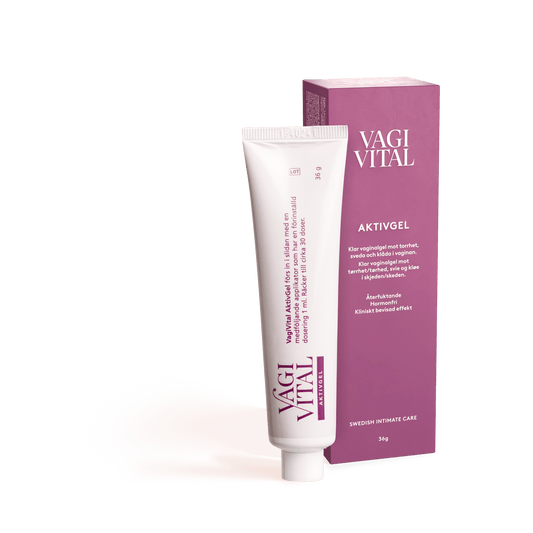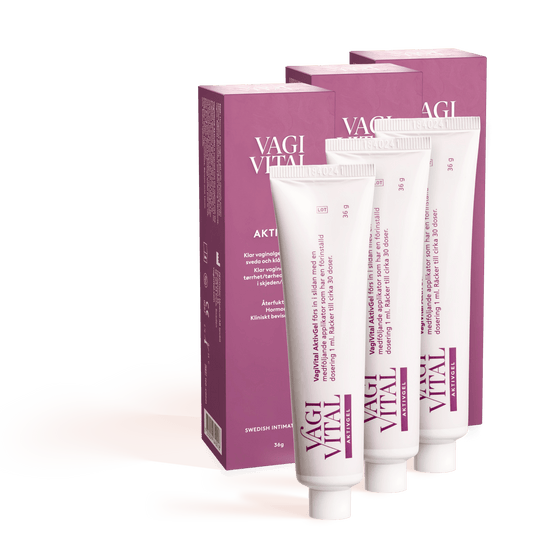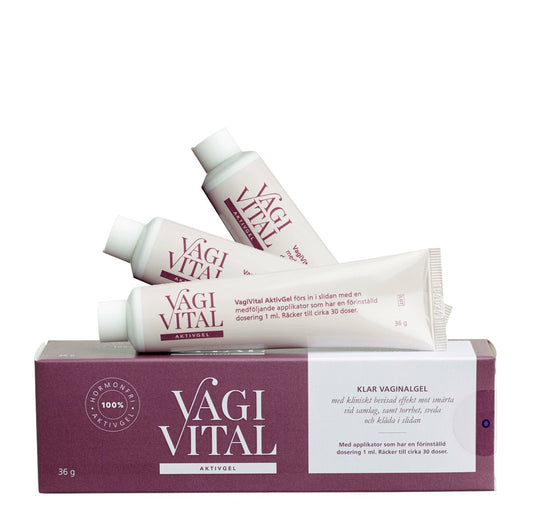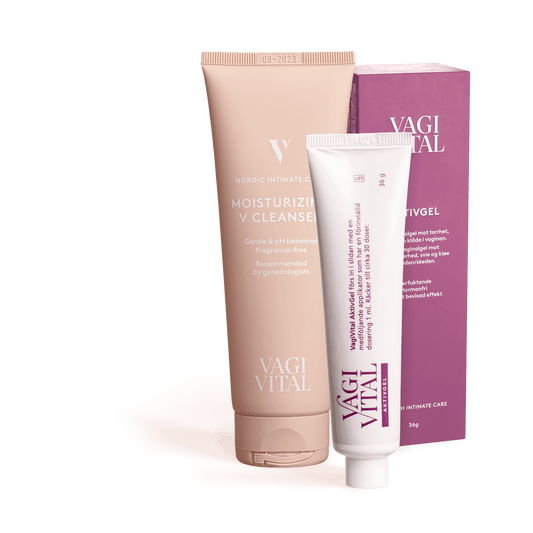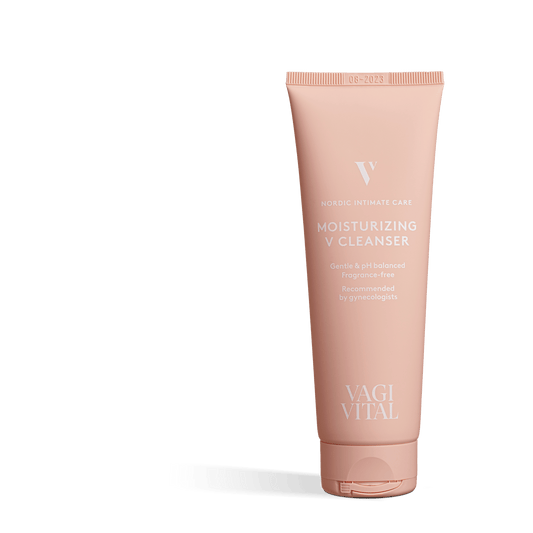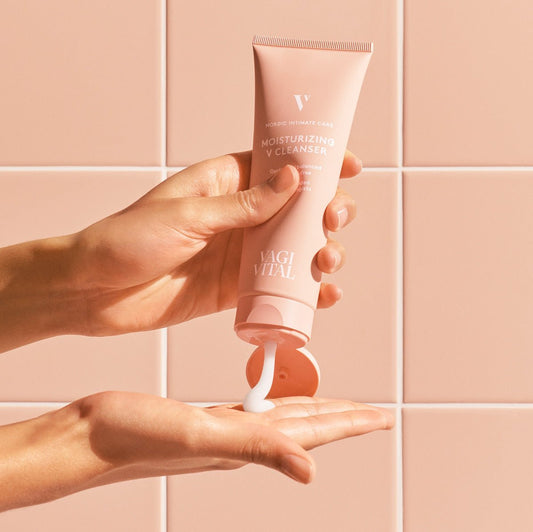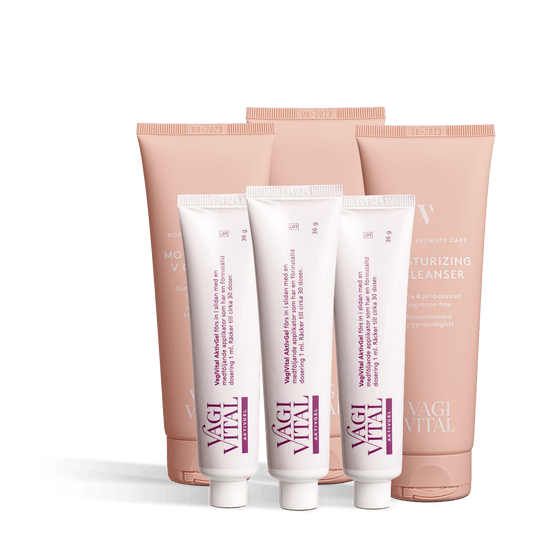BRAIN FOG – a blog about the brain during menopause
Read Fanny Falkman Grinndal's, Sweden manager for VagiVital, blog about what happens to the brain during menopause and her personal experience of brain fog.
VagiVital Menopause FSH test can be found here https://vagivital.se/products/vagivital-menopaus-fsh-test
THE BRAIN & MENOPAUSE
I am standing in the kitchen making a pasta Carbonara while talking on the phone with my best friend. The conversation ebbs and flows, we laugh and often finish each other's sentences. We have learned to understand each other even though we increasingly seem to lose words and forget names when memory fails. It is a lively, if somewhat dizzying, conversation that bounces back and forth like a ping pong ball. One topic is quickly replaced by another but we continue to have meaningful conversations in mutual understanding, even though we sometimes don't remember what we just talked about. Names of people, places, or phenomena can sometimes be completely impossible to remember. To an outsider, the conversation would probably have been completely incomprehensible.
Me: "Well, you know, the one who has a husband with a yellow bag. What is her name now?"
My friend: "Oh yes, her. So what is her name?"
(No one remembers the name)
Me: "Yes, anyway... what were we talking about?"
(No one remembers so we quickly change the subject and the conversation continues at a rapid pace)
My friend: "Yes, this summer we will probably visit my sister-in-law, you know, who lives in... what is the name of the province again... you know... well YOU KNOW... Astrid Lindgren and EMIIIL YOU FORGOT YOUR KID....(shouts in Småland dialect):
Me: "Aha, Småland! Well, how cozy! We were probably going to visit our neighbors who have a house in the archipelago... and... I've forgotten their last name... what are they called again... the ones who just bought a little black miniature poodle and the man cycles insanely many miles every weekend"
(None of us can remember the name, but it doesn't matter much, so we happily change the subject again.)
And it can go on like that. It's like a constant word game where you are NOT allowed to say the correct word but only allowed to explain the meaning.
Is it menopause that is behind this brain fog?
The term brain fog often recurs as a concept in connection with menopause. But what is it and what distinguishes brain fog from an ordinary "tired" brain?
Menopause is a natural process that occurs when a woman's ovaries gradually decrease their estrogen production. This can lead to everything from hot flashes, sleep problems, and not least dry mucous membranes where our fantastic and unique AktivGel has helped many women, but is there anything one can do to help the brain during menopause?
FIND OUT IF YOU ARE IN PERIMENOPAUSE/MENOPAUSE
VagiVital Menopause FSH test for perimenopause/menopause is designed to provide an indication if you are in perimenopause/menopause by measuring certain hormone levels. It can help you gain a better understanding of the symptoms you are experiencing and assist in deciding on possible next steps, such as seeking professional medical advice or exploring appropriate treatment options. VagiVital Menopause FSH test can be found here https://vagivital.se/products/vagivital-menopaus-fsh-test
You can find VagiVital ActiveGel for dry mucous membranes here
WOMEN'S BRAINS THROUGH HISTORY
Historically, views on women's brains have varied significantly. During antiquity and the Middle Ages, women were considered biologically and intellectually inferior to men. This perception was shaped by the theory of "women's insufficient brains," which claimed that women had smaller brains than men and were therefore less capable of intellectual and creative ability.
From the 19th century onwards, researchers began to examine differences between men's and women's brains. These studies claimed that women had less developed brains and that their brains were more adapted for emotional and nurturing abilities rather than intellectual capacity.
It was only during the 20th century and onwards that more objective and scientifically based studies on sex differences in the brain were conducted. Modern research shows that there are no fundamental differences in intelligence between the sexes and that any observed differences are more the result of social and cultural factors than biology.
Attention to women's brains in connection with menopause has been relatively limited throughout history. It is only in recent decades that research and discussions on this subject have become more prominent. Traditionally, menopause was primarily seen as a biological change in women's reproductive systems, with a focus on physical symptoms such as hot flashes and sleep problems. Psychological and neurological aspects related to the brain and menopause were not as recognized.
THE BRAIN DURING MENOPAUSE
It was not until the late 20th century and early 21st century that research began to investigate the possible connections between menopause and brain function in women. Studies have shown that changes in estrogen levels during menopause can affect brain function and are related to symptoms such as memory problems and cognitive decline.
Although there has been increased awareness of the connection between menopause and the brain in recent decades, research in the area continues but there is still much to learn.
Below are some of the changes that can occur in the brain during menopause:
🌺Cognitive changes: Some studies have found that women may experience mild cognitive changes during menopause. Commonly reported symptoms include problems with working memory, attention, and verbal ability. However, it is important to emphasize that not all women experience these changes and there is also great individual variation.
🌺Estrogen and brain function: Research suggests that decreased levels of estrogen, which occur during menopause, can affect brain function. Estrogen receptors are found in various areas of the brain involved in cognitive processes, including memory and learning. Decreased estrogen levels can impact these areas and contribute to cognitive changes.
🌺Hormone replacement therapy: Studies on the effects of hormone replacement therapy on the brain during menopause have been varied. Research has shown that hormone replacement can have a beneficial effect on cognitive functions and reduce the risk of dementia in women in menopause. But there are also other studies that have not been able to confirm these benefits and that point out potential risks and side effects of adding hormones.
🌺Depression and anxiety: There is a connection between menopause and an increased risk of depression and anxiety in some women. The hormonal changes can affect the neurotransmitter system in the brain, which can contribute to psychological symptoms during this period. But it is also important to understand that not all women experience depression or anxiety during menopause, but for those who do, it can be valuable to receive the right support and treatment.
RESEARCH ON THE BRAIN DURING MENOPAUSE
Research on the connection between the brain and menopause is still ongoing and there is much left to learn. Individual experiences may vary and it is also important to consider the diversity of experiences and needs among women in menopause.
Research shows that menopause can have a negative impact on the brain, especially memory and concentration. A study showed that women in menopause performed worse on memory tests than women before menopause. Researchers believe that memory problems may be due to a decrease in estrogen in the brain, which can affect the hippocampus, a part of the brain important for memory.
Menopause can also affect the structure of the brain. A study showed that women in menopause had less brain tissue than women before menopause, especially in areas important for memory and learning.
But not everything is negative! Another study showed that women in menopause had a better ability to handle stress than women before menopause. Researchers believe this may be because estrogen reduces levels of cortisol, a stress hormone, in the brain.
MEN'S BRAINS
Generally speaking, men's brains are affected in similar ways to women's when it comes to memory and concentration due to age. Hormones actually also play an important role in men's brains during aging. Testosterone is one of the most important hormones affecting men's brains. When testosterone production naturally decreases with age, this can affect brain function in men in various ways. Research has shown that low levels of testosterone can affect memory function and increase the risk of dementia and Alzheimer's disease. This can also affect concentration and mental focus. Low testosterone levels can also cause fatigue and depression, which in turn affects the brain. Just saying ❤
TAKE CARE OF THE BRAIN
There are many ways to preserve and improve brain function – whether it concerns menopause or age.
Below are some things that can be good to keep in mind to keep the brain going ❤
🌺Exercise
Regular exercise can improve blood flow to the brain and promote the growth of new brain cells and synapses.
🌺Diet
A healthy diet rich in fruits, vegetables, whole grains, and healthy fats can also help brain function.
🌺Brain training
Challenging the brain with activities like learning, memory exercises, and crosswords can help maintain and improve brain function
🌺Sleep
Sufficient sleep is crucial for the brain's recovery and renewal
🌺Social interactions
Spending time with friends and family can also help maintain brain function by stimulating social and cognitive skills
Menopause can sometimes make the brain feel like a fog of confusion. Sometimes I forget what I am supposed to do, what I was about to say, and why I am even in the room I am in. But despite my brain fog from time to time, I can still joke and laugh, even if I sometimes forget what the punchline was…
So next time you find the car keys in the fridge or look for the glasses sitting on your nose, think of it as an opportunity to laugh out loud at yourself and instead take the chance to give your brain a break from all the stressful things life has to offer with something that makes you feel good!
Take care of yourself & your brain ❤
Recommended products for you
- Choosing a selection results in a full page refresh.
- Opens in a new window.
